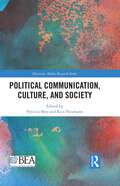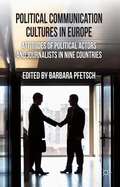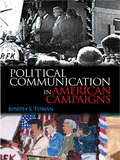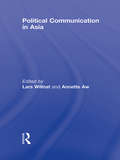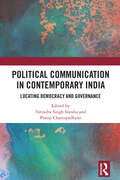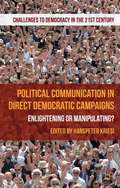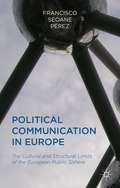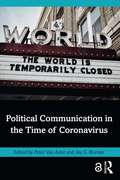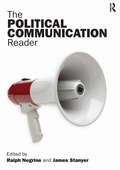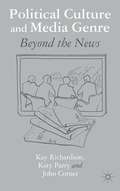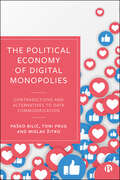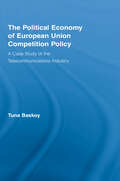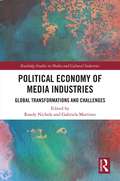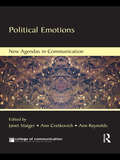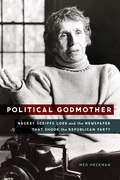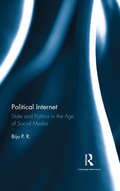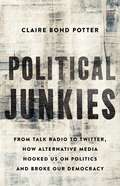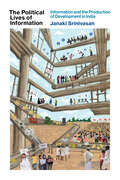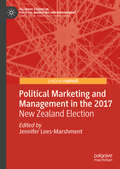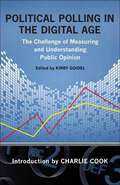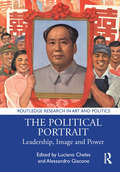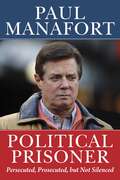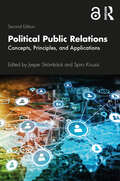- Table View
- List View
Political Communication, Culture, and Society (ISSN)
by Patricia Moy Rico NeumannAs an installment of Routledge’s Broadcast Education Association (BEA) Electronic Media Research Series, Political Communication, Culture, and Society focuses on the expansive concept of political communication and illuminates the processes, contents, and effects related to myriad forms and vehicles of political communication. Whether involving traditional print or broadcast media, social media platforms, or face-to-face discussions, political communication today has shaped how we perceive others and understand the world around us, including our place in it, and ultimately, how we engage with others as social, cultural, and political beings.Hailing from multiple locations and drawing on a multitude of theories as well as quantitative and qualitative methodologies, the volume’s contributors examine how communication intersects with politics in a broad swath of contexts, ranging from climate change to migration to the notion of political correctness. Collectively they ask and answer questions about how today’s richly textured media ecology shapes our political world and how political messages can fuel – and ameliorate – the issues that deeply cleave societies around the globe.Relevant to scholars and students of journalism, media studies, and communication sciences, this volume will help interested readers better understand today’s increasingly complex sociocultural world through the lens of political communication.
Political Communication Cultures in Europe
by Barbara PfetschThis book offers new and compelling insight into the orientations that shape the cultures of political communication in nine Western democracies. It is a truly comparative account of the views of 2500 political elites and media elites between Helsinki and Madrid on their relationship and their exchanges.
Political Communication in American Campaigns
by Joseph S. TumanIn Political Communication in American Campaigns, Joseph S. Tuman provides a comprehensive, clear, and accessible treatment of American campaign rhetoric and argues that modern elections are not really about contests between candidates or political parties; rather, they are more about the competing messages each player in the political process must present to persuade and reach voters.. This book's triangulated approach to political communication includes (1) all forms of campaign speech and oratory; (2) the rhetorical dimensions of campaign debates; and (3) candidate/campaign interaction with mass media. Key Features Allows readers to deconstruct and understand how and why speeches affect voters: Offers methods for understanding how political speeches are constructed and targeted, as well as how to apply these methodologies to a variety of campaign oratories. Provides a comprehensive and entertaining explanation of the history of campaign debates in the United States: A historical description of the evolution of political campaign helps situate modern debates within the context of specific mass media strategies and tactics employed by campaigns. Reflects how changes in mass media have now influenced how campaigns communicate messages to voters: Explores the relationship between campaigns and mass media, with an emphasis on paid and free media, and addresses the contemporary intersection of campaign Web sites and blogs with campaign main messages, fundraising, manipulating news coverage and creating ads. Offers an insider's view of how campaigns work—and how news media coverage of campaigns works: The book is written with additional insights from the author's experiences as a political consultant and as a political analyst for news media. Presents contemporary examples that all readers will understand: Real-life case studies of debates from both state and national elections; all forms of campaign oratories; and mass mediated campaigns. Intended Audience This text is designed for advanced courses dealing with such topics as political communication, media & politics, presidential rhetoric, and persuasion, as found in departments of communication, media studies, and political science.
Political Communication in Asia (Routledge Communication Series #23)
by Lars Willnat Annette AwThis edited volume provides a critical review of political communication research conducted in Asia over the past twenty years. Each chapter focuses on studies published in a specific Asian country, selected according to the level of contribution made to the field of political communication in Asia. Covering China, Hong Kong, Taiwan, South Korea, Japan, Singapore, Malaysia, Indonesia, and India, the book’s primary objective is to review the unique theoretical accomplishments made by Asian communication scholars, thus contributing to a better awareness and understanding of political communication research in Asia. The contributors are well-respected Asian media scholars writing on political communication in their countries of origin. Each author reviews studies conducted and published in his/her native country and language(s). This book provides a first review of these studies, most of which have never been published in English, and makes them available to international scholars. The contributors discuss each country’s political background, and address the findings and conclusions of the political communication studies conducted in their respective countries during the past two decades. The chapters focus on insights that have been made by adapting Western media theories to the unique social, cultural, or political contexts that exist in each country. The authors also point out possible gaps in the current research within their respective countries and to make recommendations for future studies.
Political Communication in Contemporary India: Locating Democracy and Governance
by Yatindra Singh Sisodia Pratip ChattopadhyayThis book explores the forms, patterns, and trends in political communication in India in the twenty-first century. It underlies the influence of context in political messaging laying bare its complex, overlapping, and multidimensional structures. The volume: Examines how political decision-making is shaped by media — through political speeches, community opinion leaders, and formal and informal public conversations. Explores a range of political communication channels— from community radio to social media. Presents an overview of the problems associated with message designing and message dissemination through communication channels in a political setting. Highlights how political communication impacts critical aspects of democracy and governance and goes beyond mere rhetoric. A comprehensive work on the production, diffusion, transmission, and impact of information in a political environment, this book will be of great interest to scholars and researchers of politics, governance, democracy, media and communication studies, journalism, cultural studies, and South Asian studies.
Political Communication in Direct Democratic Campaigns
by Hanspeter KriesiAnalyzes the communication processes in direct democratic campaigns and their effect on the opinion formation of the voters. Based on a detailed analysis of the politicians' strategies, media coverage and the opinion formation of the public in three campaigns, this book argues that the campaigns are more enlightening than manipulating.
Political Communication in Europe: The Cultural and Structural Limits of the European Public Sphere
by Francisco Seoane PérezThe disconnection between the institutions of the EU and the people of Europe has often been attributed to the existence of a communication gap resulting from the failure of national medias and politicians to convey the importance of the EU. This book challenges that idea instead showing that the fault lies with the idea and institutions of the EU.
Political Communication in Postmodern Democracy
by Kees Brants Katrin VoltmerThis book explores the changing relationship between politics, the media and citizens. Based on comparative evidence from the UK and the Netherlands it provides new insights into the dynamics of political communication in post-modern democracy, which is characterized by uncertainty about the location of politics and an erosion of grand narratives and political ideologies. The contributions of this volume aim to understand these changes as a two-dimensional process: the horizontal dimension encompasses the shifting power balance between politicians and the media. The vertical dimension explores how new forms of citizenship and the pervasiveness of popular culture alongside new communication technologies are challenging the authority of both established journalism and institutionalized politics. What emerges is a complex picture of politicization and de-politicization, elite dominance and the power of vox populi, mediatisation and effective control of political elites over the public agenda.
Political Communication in the Time of Coronavirus
by Peter Van AelstThis book examines how the COVID-19 pandemic impacted the flows of communication between politicians, journalists, and citizens. Distinguished contributors grapple with how the pandemic, as a global unexpected event, disrupted the communication process and changed the relationships between politics, media, and publics, the three central players of political communication. Using different methodologies, they scrutinize changes in government communication, (new) media coverage, and public opinion during this crisis. The book moves beyond the USA and Western Europe to include cases from Eastern Europe, Latin America, and Asia, taking into account how variations in the political context, the media system and personal leadership can influence how the COVID-19 pandemic challenged the political communication process. It is an ideal text for advanced students and scholars of political communication, political science, and media studies.
The Political Communication Reader
by Ralph Negrine and James StanyerThe Political Communication Reader gathers together key writings in a unique one-volume resource. The selected texts are grouped into thematic sections, each introduced by the editors, covering such areas as:the exercise of power, media and democracythe media and electionsmedia effectspolitical participation and the mediathe personalization of politicsnew technologies and the reshaping of political communication.Available as a companion Reader to Brian McNair's Introduction to Political Communication textbook, students will find The Political Communication Reader a valuable resource in this popular subject area.
Political Culture and Media Genre
by Kay Richardson Katy Parry John CornerExploring the forms and meanings of mediated politics beyond the news cycle, this book encompasses genres drawn from television, radio, the press and the internet, assessing their individual and collective contribution to contemporary political culture through textual analysis and thematic review.
The Political Economy of Digital Monopolies: Contradictions and Alternatives to Data Commodification
by Paško Bilić Toni PrugAt a time when the practices of technology companies continue to attract fierce criticism, this book asks what it actually means to hold a 'monopoly' in the tech world and how it might affect the way in which an organization operates. Combining new and traditional Marxian perspectives, the authors offer an in-depth analysis of how these technology giants are produced, financialized, and regulated. As technology firms continue to shape our political and socio-economic landscape, this book will be an invaluable resource for scholars and students who seek to understand the function of technological monopolies in contemporary capitalism.
The Political Economy of European Union Competition Policy: A Case Study of the Telecommunications Industry (New Political Economy Ser.)
by Tuna BaskoyIn the European Union (EU), competition policy occupies a central place amongst other EU public policies and is the first truly supranational public policy regulating market competition. One of the stated objectives of EU competition policy is to prevent excessive concentration of economic power in the hands of a few. This book investigates the pol
Political Economy of Media Industries: Global Transformations and Challenges (Routledge Studies in Media and Cultural Industries)
by Randy Nichols Gabriela MartinezThis book provides a critical political economic examination of the impact of increasingly concentrated global media industries. It addresses different media and communication industries from around the globe, including film, television, music, journalism, telecommunication, and information industries. The authors use case studies to examine how changing methods of production and distribution are impacting a variety of issues including globalization, environmental devastation, and the shifting role of the State. This collection finds communication at a historical moment in which capitalist control of media and communication is the default status and, so, because of the increasing levels of concentration globally allows those in control to define the default ideological status. In turn, these concentrated media forces are deployed under the guise of entertainment but with a mind towards further concentration and control of the media apparatuses many times in convergence with others
Political Emotions (New Agendas in Communication Series)
by Janet StaigerPolitical Emotions explores the contributions that the study of discourses, rhetoric, and framing of emotion make to understanding the public sphere, civil society and the political realm. Tackling critiques on the opposition of the public and private spheres, chapters in this volume examine why some sentiments are valued in public communication while others are judged irrelevant, and consider how sentiments mobilize political trajectories. Emerging from the work of the Public Feelings research group at the University of Texas-Austin, and cohering in a New Agendas in Communication symposium, this volume brings together the work of young scholars from various areas of study, including sociology, gender studies, anthropology, art, and new media. The essays in this collection formulate new ways of thinking about the relations among the emotional, the cultural, and the political. Contributors recraft familiar ways of doing critical work, and bring forward new analyses of emotions in politics. Their work expands understanding of the role of emotion in the political realm, and will be influential in political communication, political science, sociology, and visual and cultural studies.
Political Godmother: Nackey Scripps Loeb and the Newspaper That Shook the Republican Party
by Meg HeckmanNewspaper publisher and GOP kingmaker Nackey Scripps Loeb headed the Union Leader Corporation, one of the most unusual—and influential—local newspaper companies in the United States. Her unapologetic conservatism and powerful perch in the home of the first-in-the-nation presidential primary elicited fear and respect while her leadership of New Hampshire&’s Union Leader gave her an outsized role in American politics. In Political Godmother Meg Heckman looks at Loeb&’s rough-and-tumble political life against the backdrop of the right-wing media landscape of the late twentieth century. Heckman reveals Loeb as a force of nature, more than willing to wield her tremendous clout and able to convince the likes of Pat Buchanan to challenge a sitting president. Although Loeb initially had no interest in the newspaper business, she eventually penned more than a thousand front-page editorials, drew political cartoons, and became a regular on C-SPAN. A fascinating look at power politics in action, Political Godmother reveals how one woman ignited conservatism&’s transformation of the contemporary Republican Party.
Political Internet: State and Politics in the Age of Social Media
by Biju P. R.This book investigates the Internet as a site of political contestation in the Indian context. It widens the scope of the public sphere to social media, and explores its role in shaping the resistance and protest movements on the ground. The volume also explores the role of the Internet, a global technology, in framing debates on the idea of the nation state, especially India, as well as diplomacy and international relations. It also discusses the possibility of whether Internet can be used as a tool for social justice and change, particularly by the underprivileged, to go beyond caste, class, gender and other oppressive social structures. A tract for our times, this book will interest scholars and researchers of politics, media studies, popular culture, sociology, international relations as well as the general reader.
Political Journalism in Comparative Perspective
by Erik Albæk Arjen van Dalen Nael Jebril Claes H. de Vreese Erik Albæk Arjen Van Dalen Nael Jebril Claes H. de VreesePolitical journalism is often under fire. Conventional wisdom and much scholarly research suggest that journalists are cynics and political pundits. Political news is void of substance and overly focused on strategy and persons. Citizens do not learn from the news, are politically cynical, and are dissatisfied with the media. This book challenges these assumptions, which are often based on single-country studies with limited empirical observations about the relation between news production, content, and journalism's effects. Based on interviews with journalists, a systematic content analysis of political news, and panel survey data in different countries, this book tests how different systems and media-politics relations condition the contents of political news. It shows how different content creates different effects, and demonstrates that under the right circumstances citizens learn from political news, do not become cynical, and are satisfied with political journalism.
Political Junkies: From Talk Radio to Twitter, How Alternative Media Hooked Us on Politics and Broke Our Democracy
by Claire Bond PotterA wide-ranging history of seventy years of change in political media, and how it transformed -- and fractured -- American politicsWith fake news on Facebook, trolls on Twitter, and viral outrage everywhere, it's easy to believe that the internet changed politics entirely. In Political Junkies, historian Claire Bond Potter shows otherwise, revealing the roots of today's dysfunction by situating online politics in a longer history of alternative political media. From independent newsletters in the 1950s to talk radio in the 1970s to cable television in the 1980s, pioneers on the left and right developed alternative media outlets that made politics more popular, and ultimately, more partisan. When campaign operatives took up e-mail, blogging, and social media, they only supercharged these trends. At a time when political engagement has never been greater and trust has never been lower, Political Junkies is essential reading for understanding how we got here.
The Political Lives of Information: Information and the Production of Development in India (The Information Society Series)
by Janaki SrinivasanHow the definition, production, and leveraging of information are shaped by caste, class, and gender, and the implications for development.Information, says Janaki Srinivasan, has fundamentally reshaped development discourse and practice. In this study, she examines the history of the idea of &“information&” and its political implications for poverty alleviation. She presents three cases in India—the circulation of price information in a fish market in Kerala, government information in information kiosks operated by a nonprofit in Puducherry, and a political campaign demanding a right to information in Rajasthan—to explore three uses of information to support goals of social change. Countering claims that information is naturally and universally empowering, Srinivasan shows how the definition, production, and leveraging of information are shaped by caste, class, and gender. Srinivasan draws on archival and ethnographic research to challenge the idea of information as objective and factual. Using the concept of an &“information order,&” she examines how the meaning and value of information reflect the social relations in which it is embedded. She asks why casting information as a tool of development and solution to poverty appeals to actors across the political spectrum. She also shows how the power to label some things information and others not is at least as significant as the capacity to subsequently produce, access, and leverage information. The more faith we place in what information can do, she cautions, the less attention we pay to its political lives and to the role of specific social structures, individual agency, and material form in the defining, production, and use of that information.
Political Marketing and Management in the 2017 New Zealand Election (Palgrave Studies in Political Marketing and Management)
by Jennifer Lees-MarshmentThis book reveals the market research, strategy, branding and communication behind the unpredictable 2017 New Zealand election result which saw Jacinda Ardern elected Labour leader just 8 weeks before the election to become Prime Minister. Utilising rich data sources that include a 250,000 Vote Compass survey and interviews with key political advisors, it explores the alignment of the policy of National, Labour, the Greens and NZ First with party supporters, demographic segments and undecided voters. It also analyses the leadership communication and branding of the leaders Bill English, Jacinda Ardern and Andrew Little, as well as the advertising by minor parties ACT, the Greens, United Future and the Maori Party. The book provides advice for practitioners, such as: focus on being responsive, communicate delivery competence, differentiate in policy and advertising, build an energetic and charismatic leader brand and be flexible when planning.
Political Polling in the Digital Age: The Challenge of Measuring and Understanding Public Opinion (Media & Public Affairs)
by Kirby Goidel Charlie Cook Susan Herbst Scott Keeter Anna Greenberg Charles Franklin Mark BlumenthalThe 2008 presidential election provided a "perfect storm" for pollsters. A significant portion of the population had exchanged their landlines for cellphones, which made them harder to survey. Additionally, a potential Bradley effect -- in which white voters misrepresent their intentions of voting for or against a black candidate -- skewed predictions, and aggressive voter registration and mobilization campaigns by Barack Obama combined to challenge conventional understandings about how to measure and report public preferences. In the wake of these significant changes, Political Polling in the Digital Age, edited by Kirby Goidel, offers timely and insightful interpretations of the impact these trends will have on polling.In this groundbreaking collection, contributors place recent developments in public-opinion polling into a broader historical context, examine how to construct accurate meanings from public-opinion surveys, and analyze the future of public-opinion polling. Notable contributors include Mark Blumenthal, editor and publisher of Pollster.com; Anna Greenberg, a leading Democratic pollster; and Scott Keeter, director of survey research for the Pew Research Center.In an era of increasingly personalized and interactive communications, accurate political polling is more difficult and also more important. Political Polling in the Digital Age presents fresh perspectives and relevant tactics that demystify the variable world of opinion taking.
The Political Portrait: Leadership, Image and Power (Routledge Research in Art and Politics)
by Luciano Cheles Alessandro GiaconeThe leader's portrait, produced in a variety of media (statues, coins, billboards, posters, stamps), is a key instrument of propaganda in totalitarian regimes, but increasingly also dominates political communication in democratic countries as a result of the personalization and spectacularization of campaigning. Written by an international group of contributors, this volume focuses on the last one hundred years, covering a wide range of countries around the globe, and dealing with dictatorial regimes and democratic systems alike. As well as discussing the effigies that are produced by the powers that be for propaganda purposes, it looks at the uses of portraiture by antagonistic groups or movements as forms of resistance, derision, denunciation and demonization. This volume will be of interest to researchers in visual studies, art history, media studies, cultural studies, politics and contemporary history.
Political Prisoner: Persecuted, Prosecuted, but Not Silenced
by Paul ManafortNEW BOOK CLAIMS DONALD TRUMP WILL RUN AND WIN IN 2024!A riveting account of the HOAX that sent a presidential campaign chairman to solitary confinement because he wouldn&’t turn against the President of the United States. The chief weapon deployed by the government-corporate-media Establishment against the Trump presidency was propaganda. Time and again, allegations from anonymous sources were disseminated by a partisan media, promoted by a dishonest Democrat Party leadership, and ultimately debunked when the facts surfaced. But by the time the truth came out, it was too late. There had already been casualties. One of the highest profile casualties was Paul Manafort. Desperate to defeat Donald Trump—or hamper his presidency after he won—Democrats and their Establishment allies colluded with foreign operatives to concoct a completely false narrative about Paul&’s supposed conspiracy with pro-Russian elements in Ukraine to further Vladimir Putin&’s efforts to influence the 2016 presidential election. But it wasn&’t just defamation of Paul&’s character. They took the unprecedented step of enlisting the US intelligence and law enforcement communities in using their power against President Trump and his campaign team. Political Prisoner finally exposes the lies left unchallenged by media who pronounced Paul guilty long before his case ever saw the inside of a courtroom. Not only is it untrue that Victor Yanukovych or any of Paul&’s clients were &“pro-Putin,&” it is the opposite of the truth. Paul&’s work in Ukraine and throughout his career was 100 percent aligned with US interests in the countries he worked in, sometimes even acting as a back channel for the White House itself. Neither was Paul guilty of laundering money, evading taxes, or deliberately deceiving the US government by failing to register as a foreign agent—which he wasn&’t. These were all politically motivated charges manufactured by the Special Counsel&’s team for one reason and one reason only: to get Paul to testify against Donald Trump about a conspiracy that never existed. When they hear the basis of these spurious charges, Americans will wonder what country they are living in and what has happened to our system of justice. Political Prisoner tells the real story of Paul&’s life and career, exploding the lies about his work in Ukraine, his previous work with foreign governments and business interests in other countries, his involvement with the Trump campaign, and the &“process crimes&” for which he was wrongly convicted and sent to prison. It is no exaggeration to say that everything most Americans think they know about Paul Manafort is false.
Political Public Relations: Concepts, Principles, and Applications (Routledge Communication Series)
by Jesper Stromback Spiro KiousisThe second edition of Political Public Relations offers an interdisciplinary overview of the latest theory and research in the still emerging field of political public relations. The book continues its international orientation in order to fully contextualize the field amidst the various political and communication systems today. Existing chapters have been updated and new chapters added to reflect evolving trends such as the rise of digital and social media, increasing political polarization, and the growth of political populism. As a singular contribution to scholarship in public relations and political communication, this volume serves as an important catalyst for future theory and research. This volume is ideal for researchers and courses at the intersection of public relations, political communication, and political science.
